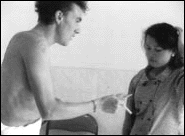|
|
|
監督・撮影:ディ・セティ
Director, Photography : Dy Sethi |
27歳。カンボジア王立美術大学で学ぶ。カンボジア文化芸術省の映画・ビデオ局勤務。94年11月から95年12月までアトリエ・ヴァランによる講習を受けた。また劇作家でもある。 27 years old. Student at the Royal University of Fine Arts of Cambodia. Works in the Department of Cinema and Video Management at the Ministry of Cambodian Culture and Fine Arts. Completed training courses at the " Ateliers Varan " studios from November ' 94 to December ' 95. He is also a playwright. |
 |
|
|
フランス政府から援助を受け、東南アジア・南米・南アフリカなど各地で映像製作のワークショップを行なっているアトリエ・ヴァランの指導で、1994-95年にカンボジア人が製作した作品4作品。Hi-8カメラを使い、映像と音を操ることを通して文化的アイデンティティを探る。 『アリーは街へ向かった』は、村からプノンペンへ上京した若い女性の「タクシーガール」生活を描く。外国人とデートしたりキャバレーの客と踊って金を得る暮らしを間近に撮った記録。 『戦争をやめた男』では、家族と質素な村の暮らしを営む元脱走兵が過去の思い出と社会の摂理を語る。 『私は普通の女の子』に登場する母親と4人の子どもは、タイの難民キャンプから帰国した後、プノンペン市内の路上で暮らしている。難民を待ち受ける生々しい現実に迫る。 『お母さんが死んじゃう』は、プノンペン郊外のあばら家に住む戦争未亡人と3人の子どもたちのぎりぎりの生活の記録。撮影中に母親が病気になるが、治療を受けるお金がない。 |
In collaboration with the French government, Ateliers Varan has been conducting documentary workshops in countries around the world to help people explore and express what cultural identity means through the use of images and sound. These four videos were shot on Hi-8 video and were completed in 1994-5. They attest to the realities and strengths of the people of Cambodia. In Ary Left For the City, a country girl leaves her village for a life as a " taxi-girl " in the city. She goes out with foreigners, dances with men in nightclubs, and makes good money. I Left the War features a deserter from the Cambodian army. Now living with his family in a village outside Phnom Phen, he talks about his past life and his experiences in the hands of a rigid class society. I ' m a Girl Like the Others follows a day in the lives of a mother and four children living in the streets of Phnom Phen. Moments of bitterness and fatigue give us insight on the reality that faces ex-refugees. In the outskirts of the city, a war widow struggles to survive and support her children in Thnoat Chroum. She falls ill but has no money for medicine. |
|
|
|
|
監督のことば なぜこの映画を撮ったのだろうか。それは3年8ヶ月と20日続いたある体制下でのカンボジア人民の「死」を見せたかったからだ。体制は百万単位で人を殺戮し、その後には数えきれないほどの寡婦や孤児を残した。またこれらのカンボジアの人々の人生を台無しにしただけではなく、他のカンボジアの人たちのそれをも汚してしまった。そしてこの体制は倒され、また別のに取って代わられた。生命は少しづつ、あらゆる分野で蘇りつつあるし、カンボジアの人々は笑顔を取り戻してもいる。しかし、ホテルやバー、売春に賭博などが、まるで雨上がりのキノコのようにどんどん増えてきている。そのせいで、女性や子どもの売買が行われ、そこで彼ら彼女らは性の市場で取引される動物よろしく売られている。バーから流れる音楽は若い娘を呼びよせ、金もあり実権もある男の胸へと引き渡していく。彼らは望むものすべてを得ているのに、貧しい人たちは道端に寝てゴミの山から生き延びる糧を掘り出している。戦争や地雷による犠牲者は、何もかも奪われ、市場に来て物乞いする。やもめになった女性は街のはずれに住み、野草を穫り貝を採ってそれを市場に売りにいく。だが店を持たないので、彼女らは警察に追い出されてしまう。警察はこのように彼女らが生きていくために必要なわずかなお金を稼ぐことまで邪魔するのだ。かろうじて毎日をのりこえていく…。数年前には、貧しい人はわずかなお金を稼ぐため、裕福な人の代わりに軍隊に入った。そして多くの人が戦争で亡くなった。彼らにとっては死を逃れることは困難だった。今日、ある人は失業したまま、また他の人は砂糖を取るために椰子の果汁を集めるというような危険な仕事を引き受けている。しかし人々は皆、彼らを無視し、誰も関心を持とうとしない。このことが私がこの映画をつくる動機となった。 |
Director's Statement Why did I make this film? Because I wanted to show the " death
" of the Cambodian people during a regime that lasted for 3 years,
8 months, and 20 days, a regime that murdered millions of people,
that left behind it innumerable widows and orphans. This regime
did not only destroy the lives of these Cambodians, but it equally
sullied that of others. When it was destroyed it was replaced
by a new government: now life is being reborn little by little,
in all areas, and the Cambodians are learning how to smile again.
But the hotels, the bars, the prostitution, the casinos...these
are all growing like mushrooms after the rain. With them comes
the trading of women and children, sold like animals in a sex
market. The music from the bars washes across young girls in the
arms of men with money and power. They can have everything they
want while the poor sleep in the gutters and search in the rubbish
heap for a something to keep them alive. The victims of the war
and the landmines, totally incapacitated, beg in the markets.
Widows live outside of the town, gathering plants and collecting
clams that they bring to sell in the markets. However, since they
don ' t have shops they are chased out by the police. Thus the
police prevent them from earning even the small amount that they
need to survive. Living from day to day... Years ago, poor people
were able to earn a small amount of money by serving in the army
in the place of rich people. Many died in the war: it was difficult
for them to escape death. Today some are left without working,
while others undertake dangerous work such as gathering coconut
milk to make sugar. But everyone ignores them: no one is interested
in their plight. It is all this that motivated me to make this
film. |
